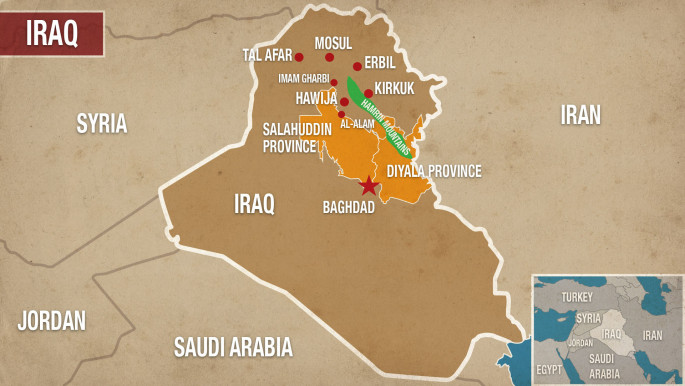Clouds form over Kurdistan as experts forecast more fighting with Baghdad
Last month, Iraqi Security Forces (ISF) and Popular Mobilization Forces (PMF) fighters attacked Kurdish Peshmerga forces on the autonomous region's borders shortly after their takeover of Kirkuk, following a successful US-brokered ceasefire.
"I think we have one more potential lunge forward by ISF to the green line [the official recognized border between Iraq and the Kurdistan Region], either negotiated or unilateral," Michael Knights, an Iraq expert and the Lafer fellow at The Washington Institute, told The New Arab.
Knights said he believes this will happen upon the conclusion of Iraq's operations against the remnants of Islamic State (IS) in Anbar province - in other words - "soon."
The latest round of clashes by the ISF and PMF on the green line saw the Peshmerga successfully afflict casualties and damages on the attacking Iraqis, most notably their usage of anti-tank missiles to destroy an American-made M1 Abrams main battle tank and several Humvees at the Altun Kupri border province on October 20.
Experts remain unclear however if Iraq's intention is to seize territory in Iraqi Kurdistan proper, hence the internationally and constitutionally-recognized autonomous region under the Kurdistan Regional Government (KRG) behind the green line.
The leader of the PMF's Asa'ib Ahl al-Haq militia claimed his forces "will enter Erbil, but for now we are waiting for the diplomatic solution."
 |
Despite the long history the US has had with Iraq there are very few lawmakers that actually know what's going on |  |
Twitter Post
|
Voice of America broadcaster Rikar Hussein reported that one reason the Americans pushed for a ceasefire between the two warring allies of the US was a PMF plan to attack Erbil.
Sources told Hussein in late October the PMF were sending heavy weaponry towards the border that were then detected by US satellites. The US State Department, according to these sources, then "ordered" Abadi not to proceed and initiate a ceasefire.
Joel Wing, the Iraq analyst who runs the Musings of Iraq blog, also believes, like Knights, that more clashes are on the way.
"Right now Erbil and Baghdad are in a holding pattern and talks are stalled," Wing told The New Arab.
"Some think they will re-start after some lawsuits are settled over the Kurdish referendum."
"If things don't move forward in the near term there is a chance that Prime Minister Abadi will decide to press his advantage and attempt to seize the Fish Khabur border crossing, where the Kurdish pipeline crosses over into Turkey.
"Or he'll take an oil field in western Nineveh Province, which the Kurds also run, in an attempt to impose government control over the KRG's economy."
This comes as the Kurds "are at a real disadvantage," Wing added.
Nevertheless, Erbil "is unwilling to accept many of Baghdad's demands".
"They feel that they are humiliating and an infringement upon their autonomy, like cutting their civil servants and Peshmerga. Also there are factions of the KDP [Kurdistan Democratic Party] who are reportedly unwilling to make any compromises."
Either way, Wing says, the Kurds "have no real leverage other than appealing to the US for help, which hasn't really been coming."
"They are going to have to give in on many of Abadi's demands."
For Wing, even the recent removal of an important line from the draft of the annual defense bill before the September 25 Kurdish independence referendum wasn't a strong indication the US will take a more pro-KRG position.
This line suggested that US support for the Kurds should be "contingent upon KRG participation in the government of a unified Iraq". There is also clear congressional discomfort with these recent ISF/PMF attacks on the Kurds.
"Congress is trying to show commitment to the Kurdistan region but I think it is a bit of an empty gesture because the executive branch tends to execute security cooperation how it wants," Knights said.
"They are unlikely to want to cut off security cooperation with Iraq based on the current behaviors of the PMF," he added.
Wing also came to essentially the same conclusion: "Removing the language that the Kurds have to work within a unified Iraq is more symbolic than anything and will unlikely affect how US aid is distributed and used in Iraq," he said.
"Despite the long history the US has had with Iraq there are very few lawmakers that actually know what's going on - and they are motivated by headline grabbing events like the recent confrontation between Baghdad and Erbil."
Paul Iddon is a freelance journalist based in Erbil, Iraqi Kurdistan, who writes about Middle East affairs.
Follow him on Twitter: @pauliddon



